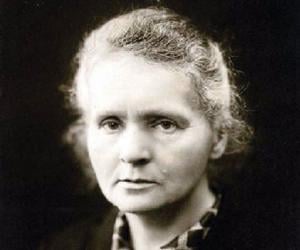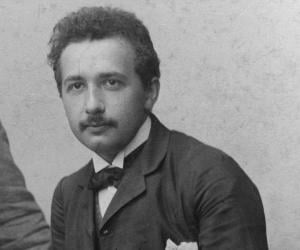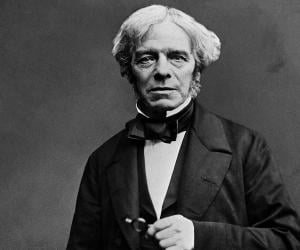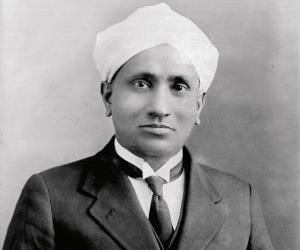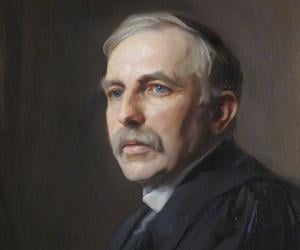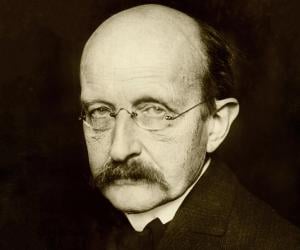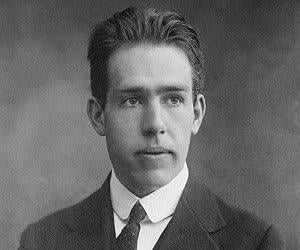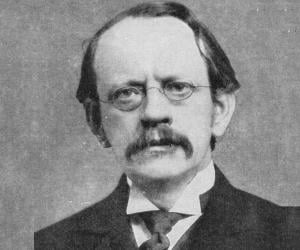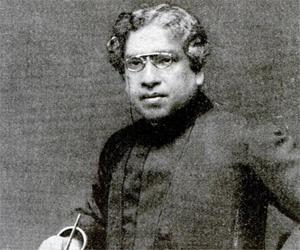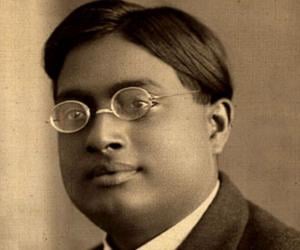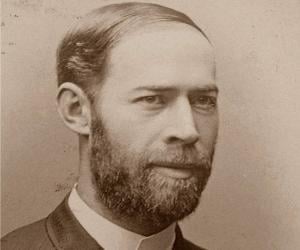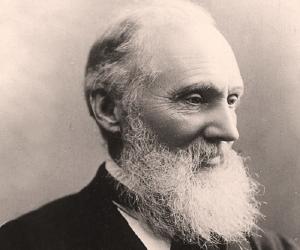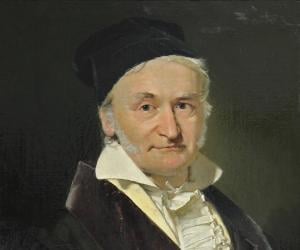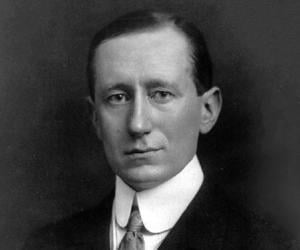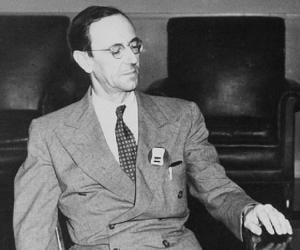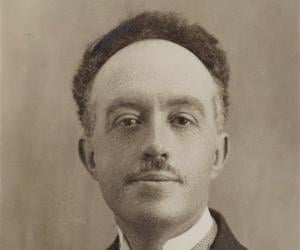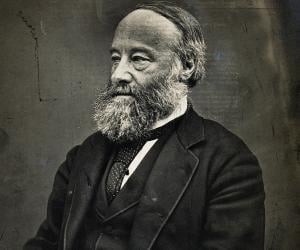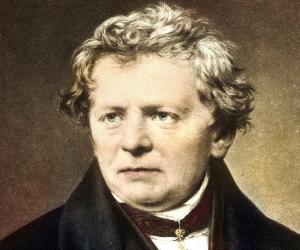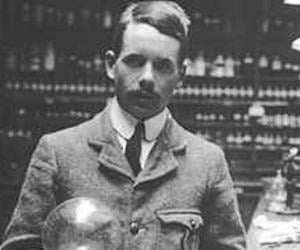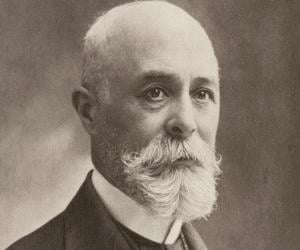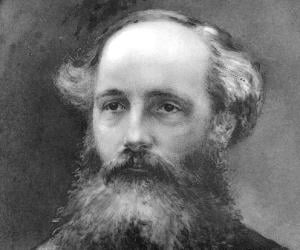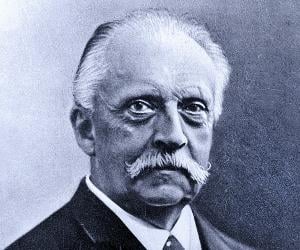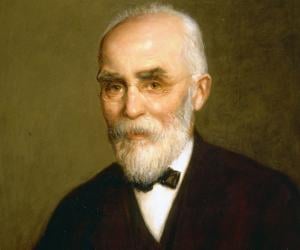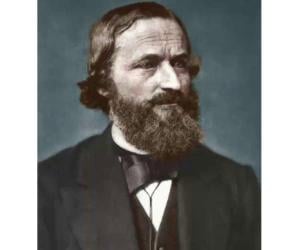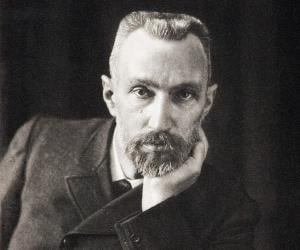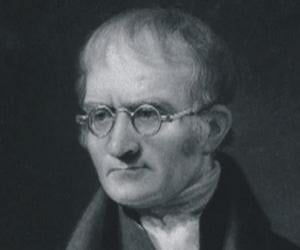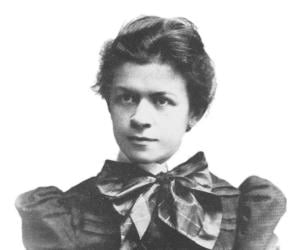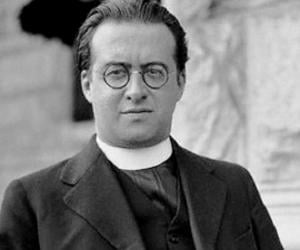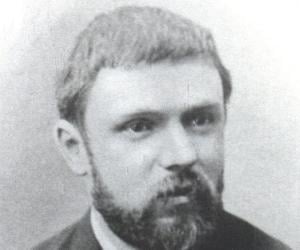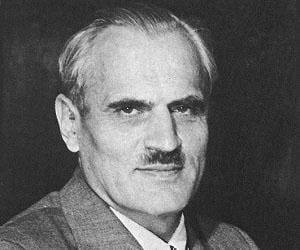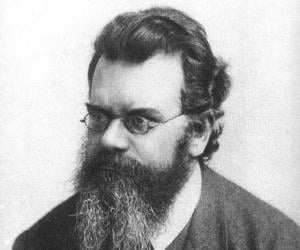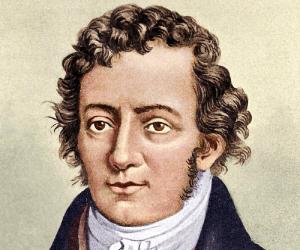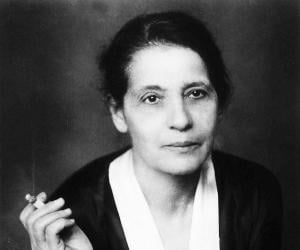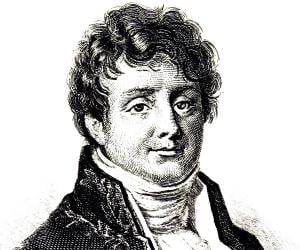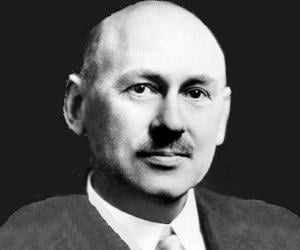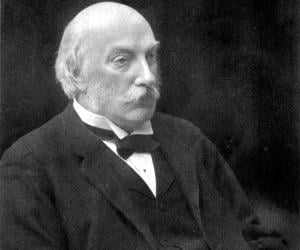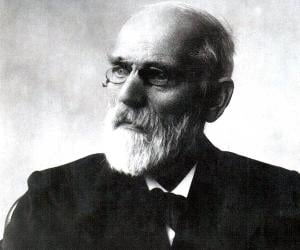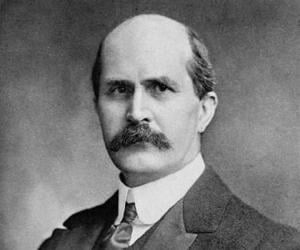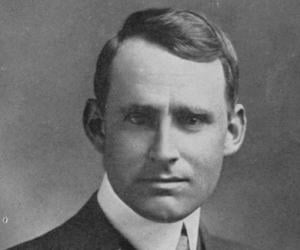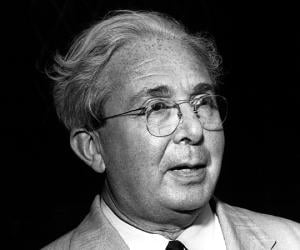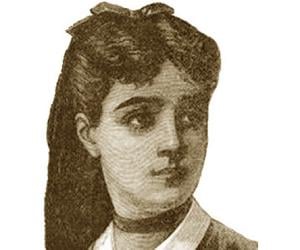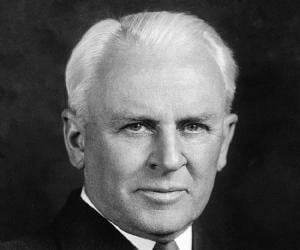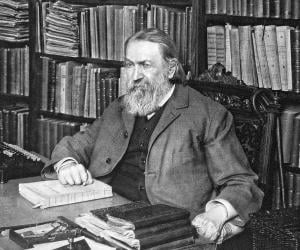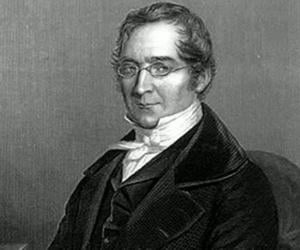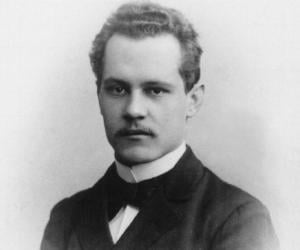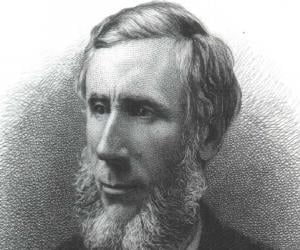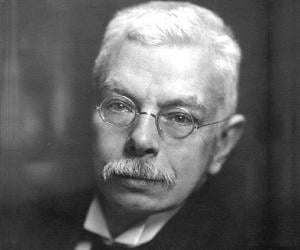Michael Faraday was an English scientist known for his contribution to the study of electrochemistry and electromagnetism. Considered one of the most influential scientists ever, Faraday's inventions of electromagnetic rotary devices established the basis for electric motor technology. His research also helped understand the concept of the electromagnetic field. Ernest Rutherford called him one of the greatest scientific discoverers ever.
New Zealand physicist Ernest Rutherford is remembered as the father of nuclear physics. His discovery of radioactive half-life and of radon, and his differentiation of alpha and beta radiation, won him the Nobel Prize in Chemistry in 1908. Element 104 was named rutherfordium in his honor.
German theoretical physicist Max Planck is remembered for originating the quantum theory of physics, which earned him the 1918 Nobel Prize in Physics. He laid down concepts such as the Planck constant and the Planck postulate. The Kaiser Wilhelm Society was later renamed Max Planck Society in his honor.
J. J. Thomson was a British physicist credited with the discovery of the electron, the first subatomic particle to be discovered. He was awarded the Nobel Prize in Physics in 1906 for his work on the conduction of electricity in gases. In 1884, he was appointed Cavendish Professor of Physics at the University of Cambridge.
Indian physicist, biologist, and plant physiologist Jagadish Chandra Bose revolutionized science with his research on how plants and animals react to external stimuli. He founded the Bose Institute, made pioneering contribution to the field of radio and microwave optics, and also penned one of the first works of Bengali science fiction.
Best known for working with Albert Einstein to form Bose–Einstein statistics, Indian scientist Satyendra Nath Bose was a master of quantum mechanics. He played the esraj, loved poetry, and had mastered quite a few languages. The Padma Vibhushan winner was also made a Fellow of The Royal Society.
Heinrich Hertz was a German physicist best remembered for proving the existence of electromagnetic waves with conclusive evidence. For his contributions, Hertz has been honored around the world by a number of countries, including Japan, Russia, and Germany. In 1930, the International Electrotechnical Commission established hertz (Hz) as the SI unit for frequency.
Lord Kelvin was a British mathematical physicist and engineer. He studied at the Glasgow University and proceeded to teach there as well. Besides his academic career, he also had a career as an electric telegraph engineer and inventor. He received the Royal Society's Copley Medal in 1883. Absolute temperatures are stated in units of kelvin in his honor.
German mathematician and physicist Carl Friedrich Gauss is remembered for his work in math and science. Known as the Princeps mathematicorum, he laid down tenets such as the Gauss's Law. He had exhibited his talent since an early age and had completed writing Disquisitiones Arithmeticae by 21.
Guglielmo Marconi was an Italian electrical engineer and inventor best remembered for his work on long-distance radio transmission. Marconi, who is credited with inventing the radio, was honored with the 1909 Nobel Prize in Physics for his work in the field of wireless telegraphy. Also a businessman, Marconi founded the Wireless Telegraph & Signal Company in 1897.
Best remembered as a Nobel laureate who discovered neutron, Sir James Chadwick began his career at Cavendish Laboratory, Cambridge, where he worked with Ernest Rutherford to investigate the nature of atomic nucleus, a work that led to the epoch-making discovery. Credited with writing the final draft of the MAUD Report, he also headed the British team at the Manhattan Project
Louis de Broglie was a French aristocrat and physicist who made important contributions to quantum theory. His de Broglie hypothesis, which suggests that all matter has wave properties, is one of the most important features in the theory of quantum mechanics. In 1929, de Broglie was honored with the Nobel Prize for Physics for his work.
English physicist, and mathematician, James Prescott Joule primarily worked on the nature of heat, in course of which he established that all forms of energy are fundamentally same and therefore inter-convertible. His findings resulted in the development of the first law of thermodynamics and negation of calorie theory. The SI derived unit of energy, the joule, is named after him.
Georg Ohm was a German mathematician and physicist. He is credited with discovering the proportionality between the voltage applied through a conductor and the subsequent electric current, which came to be known as Ohm's law. His work earned him the prestigious Copley Medal in 1841. A prolific writer, Georg Ohm published several papers and pamphlets throughout his career.
Henry Moseley was an English physicist best known for his development of Moseley's law in X-ray spectra. He made major contributions to the fields of atomic physics, nuclear physics, and quantum physics. He was working at the University of Oxford when World War I broke out, following which he went to volunteer for the Royal Engineers of the British Army.
Nobel Prize-winning physicist Henri Becquerel is known for his chance discovery of spontaneous radioactivity. Born into a family of scientists, Becquerel had been an engineer and a physics professor earlier. Marie Curie, who shared the Nobel with him and her husband, Pierre, was one of his doctoral students.
Scottish physicist James Maxwell’s contributions included the formulation of the classical theory of electromagnetic radiation and the production of the first light-fast color photograph. His Maxwell–Boltzmann distribution explored the kinetic theory of gases. He has also written poems and was an Elder of the Church of Scotland.
A descendant of Pennsylvania founder William Penn through his mother, Hermann von Helmholtz studied medicine, pushed by his father, in spite of being interested in the natural sciences. Best known for his law of conservation of energy, he coalesced the fields of medicine, physiology, math, and physics in his studies.
Nobel Prize-winning Dutch physicist Hendrik Lorentz, a major figure of the Second Dutch Golden Age, is remembered for his discovery of the Zeeman effect, along with his former student Pieter Zeeman, who shared the Nobel with Lorentz. His research on electromagnetic radiation prepared ground for Einstein’s special theory of relativity.
Gustav Kirchhoff was a German physicist who is credited with coining the term black-body radiation. He is best remembered for his contribution to the basic understanding of spectroscopy, electrical circuits, and the emanation of black-body radiation. In 1862, he received the prestigious Rumford Medal. The Bunsen-Kirchhoff Award is named after Gustav Kirchhoff and German chemist Robert Bunsen.
A pioneer in crystallography, radioactivity, piezoelectricity, and magnetism, Pierre Curie was a French physicist who won the Nobel Prize in Physics along with Henri Becquerel and Marie Curie. Despite being an atheist, Pierre Curie was fascinated by spiritualism as he believed that spiritual questions deal with physics.
John Dalton was an English chemist, physicist, and meteorologist most famous for introducing the atomic theory into chemistry. He also contributed a lot to the study of color blindness, sometimes referred to as Daltonism in his honor. He was the first scientist to refer to the smallest particle of matter as an “atom.” He was a Quaker and lived modestly.
Georges Lemaître was a mathematician, astronomer, and professor of physics. Lemaître was the first person to theorize that the expansion of the universe can be used to explain the recession of nearby galaxies. In 1927, Lemaître published the first estimation of the Hubble constant. He also came up with the Big Bang theory to explain the origin of the universe.
American physicist Arthur Compton is best-known for introducing Compton wavelength, discovering Compton scattering, first identifying the Compton–Getting effect in the intensity of cosmic rays along with Ivan A. Getting, and for the Compton generator. He received the Nobel Prize in Physics in 1927 for discovering Compton effect. He also remained a prominent figure during the Manhattan Project.
Austrian physicist and philosopher, Ludwig Boltzmann, played a key role in the development of statistical mechanics. As a young man, he was appointed a professor of mathematical physics at the University of Graz. He worked extensively with other physicists over the course of his brilliant academic career. He suffered from bipolar disorder and died by suicide in 1906.
Andre Marie Ampere was a French physicist and mathematician. He is best known for being one of the founders of the science of classical electromagnetism. He was a professor at the École Polytechnique and the Collège de France and a member of the French Academy of Sciences. The base SI unit of electric current, the ampere, is named after him.
Lise Meitner was an Austrian-Swedish physicist best remembered for her contributions that led to the discoveries of nuclear fission and the element protactinium. Nicknamed the German Marie Curie by Albert Einstein, Lise Meitner became the second woman in the world to receive a doctorate in physics in 1905. In 1997, chemical element 109 meitnerium was named in her honor.
Joseph Fourier was a French physicist and mathematician best remembered for commencing the investigation of the Fourier series, which is used widely to solve problems of heat transfer and vibrations. Fourier's law of conduction and Fourier transform are named in his honor. Fourier is also said to have discovered the greenhouse effect.
The son of a machine shop owner, Robert H. Goddard grew up to become a pioneer of rocketry. Interested in physics and mechanics since childhood, he dreamed of space flight. He developed the world’s first rocket that ran on liquid fuel. NASA's Goddard Space Flight Center is named after him.
Although John William Strutt, 3rd Baron Rayleigh, received the Nobel Prize for his discovery and isolation of the inert gas argon, his contributions to Physics is not limited to that. Known to make extensive contributions to theoretical and practical physics, especially in the fields of acoustics and optics, his works are now considered to mark the beginning of modern acoustics.
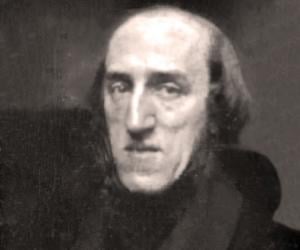
Belgian physicist and mathematician Joseph Plateau was a pioneer of the modern animation and movie industry, as he invented the phenakistiscope, the world’s first device to create an illusion of motion through images. He also laid down the structure of soap films through Plateau's laws.
William Henry Bragg was an English physicist, chemist, and mathematician. He is best known for sharing the 1915 Nobel Prize in Physics with his son Lawrence Bragg for their work in the analysis of crystal structure by means of X-rays. William Henry Bragg had an illustrious academic career and was elected president of the Royal Society in 1935.
Arthur Eddington was an English physicist, astronomer, and mathematician. He wrote numerous articles that explained Albert Einstein's theory of general relativity to the English-speaking world. He began his career in academics and eventually shifted to astronomy, becoming the chief assistant to the Astronomer Royal at the Royal Greenwich Observatory. He was a recipient of the Henry Draper Medal.
Physicist Leó Szilárd, one of the "Martians," or eminent scientists who had migrated from Hungary to the U.S., was the first to initiate a controlled nuclear chain reaction and was closely associated with the Manhattan Project, meant to develop the atomic bomb. He later advocated for responsible use of nuclear powers.
French mathematician Sophie Germain had used the pseudonym M. Le Blanc to get hold of notes from the École Polytechnique, as being a woman, she was not allowed to attend the institute. She later contributed to the number theory and also pioneered the elasticity theory. She died of breast cancer.
Nobel Prize-winning experimental physicist Robert Andrews Millikan had begun his career as a faculty member at the University of Chicago and penned countless physics books. He later devoted himself to his research on elementary electronic charge and the photoelectric effect. His famous oil-drop experiment is known to all physics enthusiasts.
Austrian physicist and philosopher Ernst Mach is remembered for his contributions to the study of shock waves. He is also credited for discovering a non-acoustic function of the inner ear that helps control human balance. As a philosopher of science, he is considered a major influence on logical positivism and American pragmatism.
Known for his pathbreaking Gay-Lussac's Law, French chemist-physicist Joseph Louis Gay-Lussac was also the first, along with his colleague Alexander von Humboldt, to discover that water is composed of one part of oxygen and two parts of hydrogen. His name is one of the 72 that adorn the Eiffel Tower.
German physicist Arnold Sommerfeld initially taught math and theoretical physics and later came to be known for his groundbreaking work on atomic and quantum physics and wave mechanics. He also laid down the magnetic quantum number. Many of the doctoral and post-doctoral students he supervised later won the Nobel Prize.
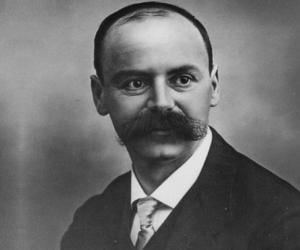
Karl Schwarzschild was a German astronomer and physicist. He is remembered for his contributions to the general theory of relativity; Schwarzschild came up with the first exact solution to the Albert Einstein field equations. He also contributed immensely to the theory of black holes.
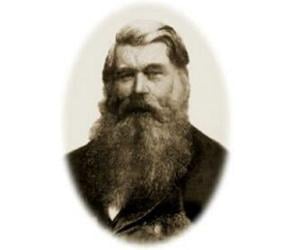
Joseph Swan was an English chemist, physicist, and inventor known for being an independent early developer of a successful incandescent light bulb. He developed and supplied the first batch of incandescent lights used for illuminating houses and public buildings. He was elected a Fellow of the Royal Society (FRS) in 1894 and knighted by King Edward VII in 1904.
Born into a poor Protestant family, Irish physicist John Tyndall was a self-made man who funded his own doctoral education. His contributions include his research on the greenhouse effect and the discovery of the Tyndall effect. Not known to many, he was also an avid mountaineer and glaciologist.
Pieter Zeeman was a Dutch physicist whose discovery of the Zeeman effect earned him the prestigious Nobel Prize in Physics in 1902, which he shared with Hendrik Lorentz. Over the course of his career, Zeeman received several other awards, such as the Matteucci Medal in 1912, Henry Draper Medal in 1921, Rumford Medal in 1922, and Franklin Medal in 1925.
